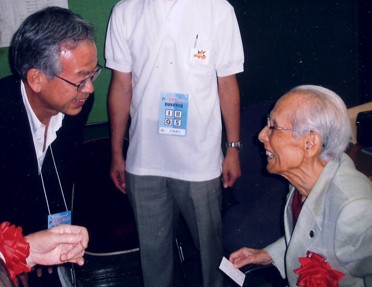| Brothers in Sumo – part two Brian Lewin |

 |
| Yokozuna Comparisons Joe Kuroda |

 |
| Rikishi of Old John Gunning |

 |
| Heya Peek Barbara Ann Klein |

 |
| SFM Interview John Gunning |

 |
| Sumo 101 Barbara Ann Klein |

 |
| Photo Bonanza See the Hatsu Basho |
 |
| Hatsu Basho Review Lon Howard |

 |
| Lower Division Rikishi Mikko Mattila |

 |
| Haru Basho Forecast Pierre Wohlleben & Mark Buckton |

 |
| Kimarite Focus Mikko Mattila |
 |
| Minusha John McTague |
 |
| Online Gaming Alexander Nitschke |

 |
| Kokugi Connections Todd Lambert |

 |
| Fan Debate Feb's debate sees |
 |
SFM Cartoons
Benny Loh & Stephen Thompson
In the third of our cartoon bonanzas, sit back and enjoy BL’s offerings and put a caption to ST’s pic to win yourselves a banzuke
| Let’s Hear From You What was it that |

 |
| Readers’ Letters See what some SFM |

 |
Sumo Quiz
The Quizmaster
Answer the Qs and win yourself next basho’s banzuke.

Kazuyoshi Yoshikawa (left) with former NHK sumo presenter Mr. Shimura (Photo by Mr. Nishida)
JG – Your company organized the Las Vegas event last year. Apart from the final day, the numbers attending were a little disappointing. If I were to ask you if you considered the tour a success, what would you say?
KY – I would say it was a success. These kinds of things cannot just be measured by looking at the balance sheet and seeing how much money was made. There is much more to it than that. In hindsight, perhaps you could say the venue was a little large for sumo in Las Vegas, but there were many positives that everyone involved took from the tour.
JG – Continuing the theme of all things foreign in sumo, what’s your view on the number of non-Japanese competing in Ozumo now, and do you agree with the “one foreigner per heya rule”?
KY – For me the thing that I notice most is how well the foreign rikishi speak Japanese. I believe that language and thinking are intertwined. It’s my feeling that if the foreign rikishi have such good understanding of
Next
JG – It sounds like life was full of excitement in the heya?
KY – Actually, there were two different types of life in the heya. When everyone was there it was always lively and exciting, but almost six months out of every twelve, my parents and all the rikishi would be away at honbasho or on jungyo, etc., so there was only myself, my brother and our housekeeper
JG – At the time you were a child, Japan was recovering from the devastation of WWII. Your father, like many rikishi at the time, was drafted into the army during the war. Did he ever talk about what that was like?
KY – Once as a child I did ask him if he had fought in the war. He told me that because rikishi were so large, no uniforms could be found that would fit them, so they didn’t have to join. Of course, when I got a little older, I saw a picture of him in uniform and realised he had just been
